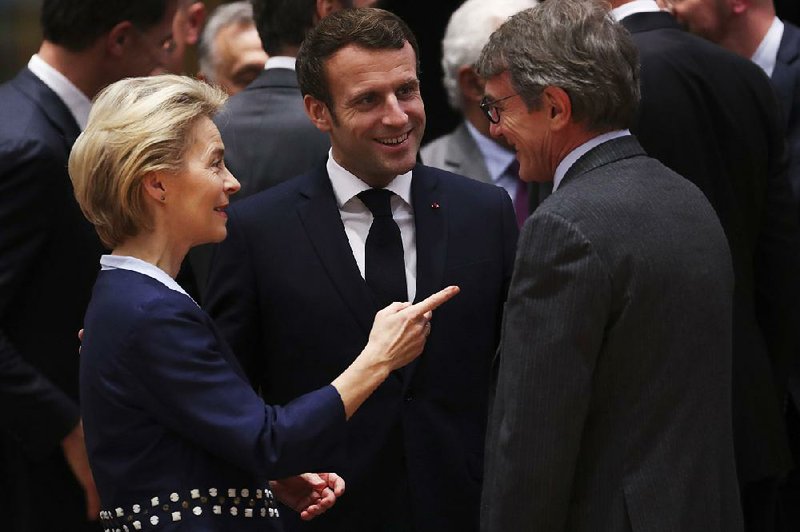BRUSSELS -- A day after the EU's new chief unveiled her "master plan" for climate neutrality, a big question mark remained Thursday about the ability to secure a deal for the bloc to become carbon neutral by 2050 because of three reluctant eastern member states.
As heads of states and governments gathered in Brussels for a two-day summit, Poland, Hungary and the Czech Republic remained unconvinced. Their support is needed for an agreement to win approval.
The climate topic triggered "intense but good" discussions, according to an EU official, speaking on condition of anonymity because the talks were still underway. Discussion was initially set for the afternoon, but only "six or seven leaders" had spoken before dinner, including Czech Prime minister Andrej Babis, the EU official said.
Making the bloc's economy carbon neutral by 2050 has been a hot topic on the European agenda for months, but the proposal failed to get approval at a summit in June and was relegated to a non-binding footnote in the final statement of that summit.
Ursula von der Leyen has since been appointed as the new chief of the EU Commission, the bloc's executive arm, and has made the fight against climate change her top priority. Another failure this week to get support from all members would be seen as an ill-fated start for her five-year tenure.
"In March, we were only two countries in support, then it was eight, and progressively we convinced more people," French President Emmanuel Macron said upon arrival at the summit. "This afternoon, around the table, maybe there will be one or two members still missing. But we will do everything to convince our partners that the transition is indispensable."
A major problem for the three poorer coal-dependent nations is the heavy costs associated with transforming their economy and energy sources. Macron acknowledged they would be the hardest hit and would need financial help.
To get the support of all EU members, von der Leyen on Wednesday unveiled a new "European Green Deal," with an offer of some $130 billion in public and private funds to help the fossil-fuel reliant EU nations make the transition to lower emissions.
European Council President Charles Michel said he hopes an agreement will be forthcoming.
"Climate neutrality is a very important goal," he said.
In addition to the cash issue, leaders also must find a compromise on the type of energies that will be used during the transition.
The Czechs want guarantees that they won't be prevented from developing nuclear power units and will have the support of France, whose electricity production is largely provided by nuclear sources.
"Nuclear is part of the transition," Macron said. "The all-coal countries won't be able to switch to all-renewable overnight."
Hungarian Prime Minister Viktor Orban has set four conditions for signing the climate deal, including securing support for nuclear energy and ensuring that energy and food prices do not rise.
According to a proposal obtained by state news wire MTI, the Hungarian government also wants the cost of climate protection to be paid not by the people but by "large climate-destroyers," including big corporations and major polluting countries, as they're the ones profiting most from increased CO2 emissions.
Orban also wants the EU to keep distributing cohesion funds, arguing that money needs to be taken away not from the poorer countries but from the richer, larger polluters.
According to the government, Hungary is one of 21 countries that, since 1990, has been able to boost economic growth while also cutting CO2 emissions by 32% and energy consumption by 15%.
Before reaching carbon neutrality, Von der Leyen wants the bloc to reduce carbon emission by at least 50% by 2030 compared with 1990 levels, more than the current goal of 40%. If possible, she would like to increase the EU's target for 2030 to as high as 55% without hurting the bloc's economy.
Climate policy experts have urged the EU to quickly implement tougher emissions targets for 2030. Frans Timmermans, the commissioner in charge of the Green Deal, said he hoped the proposal for the EU's 2030 emissions reduction targets would be ready in June.
Greenpeace activists, who have described Von der Leyen's plans as "too little too late," staged a protest before the meeting started. They scaled the European Union's new headquarters and unfurled a banner warning of a "climate emergency."
Information for this article was contributed by Lorne Cook, Angela Charlton, Sylvain Plazy, Pablo Gorondi and Frank Jordans of The Associated Press.
A Section on 12/13/2019
